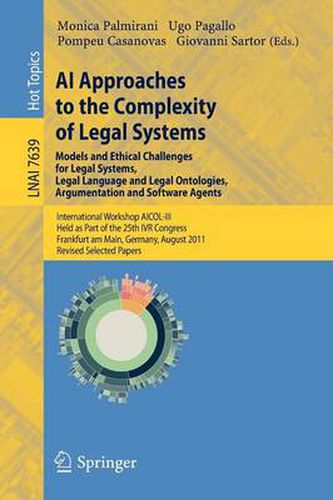Readings Newsletter
Become a Readings Member to make your shopping experience even easier.
Sign in or sign up for free!
You’re not far away from qualifying for FREE standard shipping within Australia
You’ve qualified for FREE standard shipping within Australia
The cart is loading…






This title is printed to order. This book may have been self-published. If so, we cannot guarantee the quality of the content. In the main most books will have gone through the editing process however some may not. We therefore suggest that you be aware of this before ordering this book. If in doubt check either the author or publisher’s details as we are unable to accept any returns unless they are faulty. Please contact us if you have any questions.
The inspiring idea of this workshop series, Artificial Intelligence Approaches to the Complexity of Legal Systems (AICOL), is to develop models of legal knowledge concerning organization, structure, and content in order to promote mutual understanding and communication between different systems and cultures. Complexity and complex systems describe recent developments in AI and law, legal theory, argumentation, the Semantic Web, and multi-agent systems. Multisystem and multilingual ontologies provide an important opportunity to integrate different trends of research in AI and law, including comparative legal studies. Complexity theory, graph theory, game theory, and any other contributions from the mathematical disciplines can help both to formalize the dynamics of legal systems and to capture relations among norms. Cognitive science can help the modeling of legal ontology by taking into account not only the formal features of law but also social behaviour, psychology, and cultural factors. This book is thus meant to support scholars in different areas of science in sharing knowledge and methodological approaches. This volume collects the contributions to the workshop’s third edition, which took place as part of the 25th IVR congress of Philosophy of Law and Social Philosophy, held in Frankfurt, Germany, in August 2011. This volume comprises six main parts devoted to the each of the six topics addressed in the workshop, namely: models for the legal system ethics and the regulation of ICT, legal knowledge management, legal information for open access, software agent systems in the legal domain, as well as legal language and legal ontology.
$9.00 standard shipping within Australia
FREE standard shipping within Australia for orders over $100.00
Express & International shipping calculated at checkout
This title is printed to order. This book may have been self-published. If so, we cannot guarantee the quality of the content. In the main most books will have gone through the editing process however some may not. We therefore suggest that you be aware of this before ordering this book. If in doubt check either the author or publisher’s details as we are unable to accept any returns unless they are faulty. Please contact us if you have any questions.
The inspiring idea of this workshop series, Artificial Intelligence Approaches to the Complexity of Legal Systems (AICOL), is to develop models of legal knowledge concerning organization, structure, and content in order to promote mutual understanding and communication between different systems and cultures. Complexity and complex systems describe recent developments in AI and law, legal theory, argumentation, the Semantic Web, and multi-agent systems. Multisystem and multilingual ontologies provide an important opportunity to integrate different trends of research in AI and law, including comparative legal studies. Complexity theory, graph theory, game theory, and any other contributions from the mathematical disciplines can help both to formalize the dynamics of legal systems and to capture relations among norms. Cognitive science can help the modeling of legal ontology by taking into account not only the formal features of law but also social behaviour, psychology, and cultural factors. This book is thus meant to support scholars in different areas of science in sharing knowledge and methodological approaches. This volume collects the contributions to the workshop’s third edition, which took place as part of the 25th IVR congress of Philosophy of Law and Social Philosophy, held in Frankfurt, Germany, in August 2011. This volume comprises six main parts devoted to the each of the six topics addressed in the workshop, namely: models for the legal system ethics and the regulation of ICT, legal knowledge management, legal information for open access, software agent systems in the legal domain, as well as legal language and legal ontology.